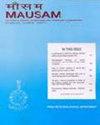Effect of spatial resolution of climatological data on streamflow simulations using the SWAT : A case study
IF 0.7
4区 地球科学
Q4 METEOROLOGY & ATMOSPHERIC SCIENCES
引用次数: 0
Abstract
Data quality always affects the accuracy of model output. Rainfall is the basic data required in hydrological modelling as rainfall to runoff conversion is the core of all such models. Regional modelling studies required high resolution spatio-temporal data and availability of data at appropriate resolution also greatly affect the modelling results. Therefore, efforts have been started to record climatic variables at finer resolution so that they will be useful for block level and gram Panchayat level studies. In this study, an effort has been made to identify the effect of using various resolution climatic data on streamflow simulation in the Kesinga catchment of the Mahanadi river basin. Three types of rainfall sets with spatial resolution of 0.25° × 0.25° and 1° × 1° from IMD and one set of recorded rainfall data of the Special Relief Commissioner (SRC), Govt. of Odisha is used in combination with IMD 1° × 1° gridded temperature to simulate streamflow at the Kesinga gauging station using the Soil and Water Assessment Tool (SWAT) keeping other parameters constant. The three simulations were analyzed using NSE, R2, RMSE, PBIAS, P-factor and R-factor. The results depicted that IMD gridded rainfall data sets predicted similar flows compared to the SRC recorded rainfall data which proves the fairness of IMD gridded data is at par with the recorded rainfall data of SRC, Govt. of Odisha.气候资料空间分辨率对利用SWAT模拟河流的影响:一个案例研究
数据质量总是影响模型输出的准确性。降雨是水文建模所需的基本数据,降雨到径流的转换是所有水文模型的核心。区域模拟研究需要高分辨率的时空数据,适当分辨率数据的可得性对模拟结果也有很大影响。因此,已经开始努力以更精细的分辨率记录气候变量,以便它们将对块级和克级Panchayat级的研究有用。在本研究中,研究了不同分辨率气候数据对Mahanadi河流域Kesinga集水区流量模拟的影响。在保持其他参数不变的情况下,利用IMD空间分辨率为0.25°× 0.25°和1°× 1°的三种降雨集和奥里萨邦政府特别救灾专员(SRC)记录的一组降雨数据,结合IMD 1°× 1°网格温度,利用水土评估工具(SWAT)模拟Kesinga测量站的河流流量。采用NSE、R2、RMSE、PBIAS、p因子和r因子对3种模拟结果进行分析。结果表明,与SRC记录的降雨数据相比,IMD网格化降雨数据集预测的流量相似,这证明IMD网格化数据的公平性与SRC记录的奥里萨邦降雨数据相当。
本文章由计算机程序翻译,如有差异,请以英文原文为准。
求助全文
约1分钟内获得全文
求助全文
来源期刊

MAUSAM
地学-气象与大气科学
CiteScore
1.20
自引率
0.00%
发文量
1298
审稿时长
6-12 weeks
期刊介绍:
MAUSAM (Formerly Indian Journal of Meteorology, Hydrology & Geophysics), established in January 1950, is the quarterly research
journal brought out by the India Meteorological Department (IMD). MAUSAM is a medium for publication of original scientific
research work. MAUSAM is a premier scientific research journal published in this part of the world in the fields of Meteorology,
Hydrology & Geophysics. The four issues appear in January, April, July & October.
 求助内容:
求助内容: 应助结果提醒方式:
应助结果提醒方式:


